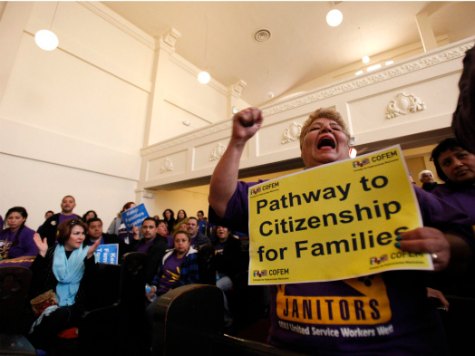
This week, the Washington Post began the process of informing its readers that the prospects of Congress granting amnesty to 11 million illegal immigrants is fading. At its politics blog, The Fix, Post reporter Aaron Blake tried to explain “why immigration reform is in trouble.” It turns out August has not been kind to the Senate’s “Gang of 8” amnesty legislation.
The Post article focuses on California GOP Rep. Jeff Denham. With a district that is 40% Hispanic, Denham has long been a supporter of comprehensive immigration reform. Agriculture, which is often heavily dependent on immigrant labor, is a major industry in his district. He is one of the first Republicans supporters of immigration reform need to recruit to have any hope of passing legislation out of the House. As Congress nears the end of its August recess, however, Denham’s opposition to the Senate bill has hardened.
In early August, at the beginning of recess, Denham voiced support for the Senate bill and “lamented” that it wasn’t getting a vote in the House. “I am frustrated,” Denham told the Modesto Bee. “I thought we’d get this done before the August work period. I think the Senate made tremendous progress. It was done bipartisan and I thought that would be enough to get the House moving forward.”
Just a few weeks later, however, is a different story. “Many of the provisions of the Senate bill, passed on a bipartisan basis, have his support,” Denham’s spokeswoman Jordan Langdon told the Post. “However, he believes the Senate bill is flawed, and that the strongest immigration reform legislation will come out of a conference between the two chambers.”
Asked whether Denham would oppose the Senate bill if it came to a vote, Langdon replied: “Correct.”
The foundational flaw in the Senate bill is that it isn’t really meaningful immigration reform-at least in the way most people consider the issue. It delivers legalization and a path to citizenship right away, while promising better security and enforcement in the future. Americans aren’t necessarily opposed to amnesty, so long as it is a one time event and there isn’t another wave of illegal immigration in the future.
The Senate bill, unfortunately, closely resembles the amnesty law in 1986. Then, legalization was immediately granted to three million illegal immigrants with the promise of more security. Obviously, that promise was never met.
Even under the most optimistic scenario, assuming the Obama Administration enforces the immigration laws, the CBO found that the Senate bill would only cut illegal immigration in half. That, remember, is the best case scenario.
Denham’s apparent shift on the issue is perhaps the death knell of the Senate bill. Even without the coming budget, fiscal, and foreign policy distractions, Congress would have little time to undertake the fundamental rewriting of the Senate bill that passage requires.
Even the Washington Post understands this.

COMMENTS
Please let us know if you're having issues with commenting.